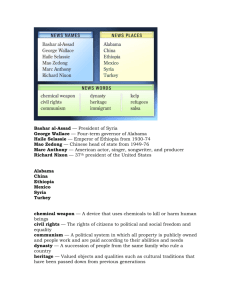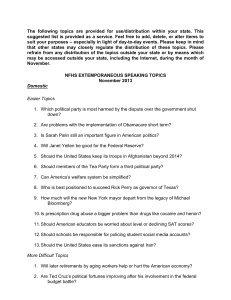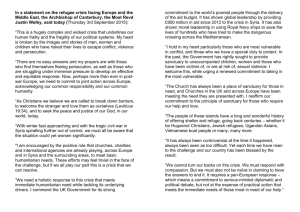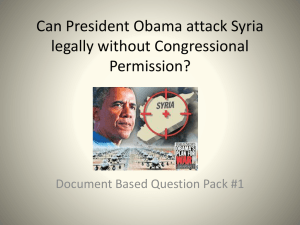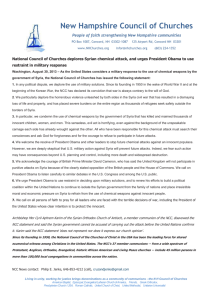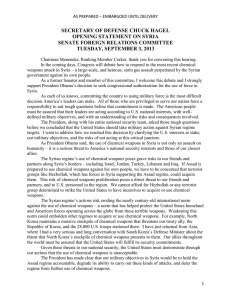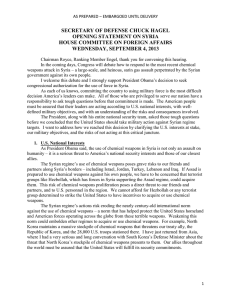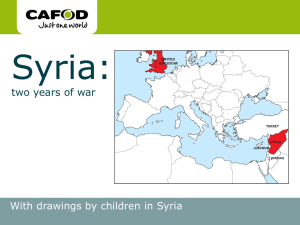Don't Attack Syria - Coalition for Peace Action
advertisement
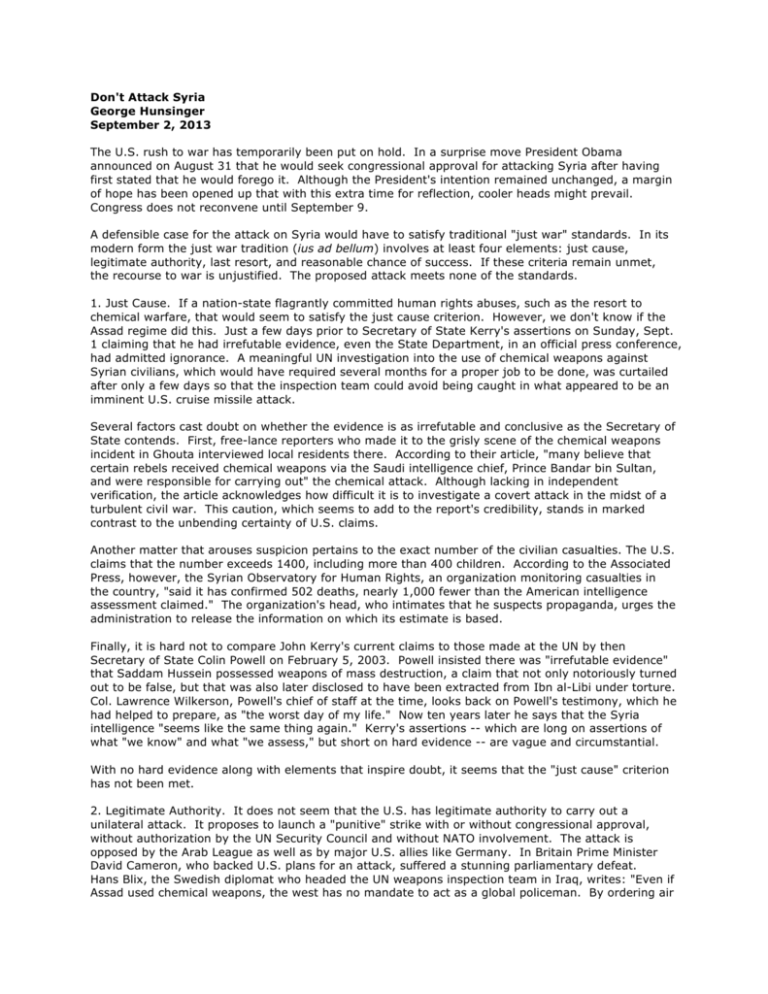
Don't Attack Syria George Hunsinger September 2, 2013 The U.S. rush to war has temporarily been put on hold. In a surprise move President Obama announced on August 31 that he would seek congressional approval for attacking Syria after having first stated that he would forego it. Although the President's intention remained unchanged, a margin of hope has been opened up that with this extra time for reflection, cooler heads might prevail. Congress does not reconvene until September 9. A defensible case for the attack on Syria would have to satisfy traditional "just war" standards. In its modern form the just war tradition (ius ad bellum) involves at least four elements: just cause, legitimate authority, last resort, and reasonable chance of success. If these criteria remain unmet, the recourse to war is unjustified. The proposed attack meets none of the standards. 1. Just Cause. If a nation-state flagrantly committed human rights abuses, such as the resort to chemical warfare, that would seem to satisfy the just cause criterion. However, we don't know if the Assad regime did this. Just a few days prior to Secretary of State Kerry's assertions on Sunday, Sept. 1 claiming that he had irrefutable evidence, even the State Department, in an official press conference, had admitted ignorance. A meaningful UN investigation into the use of chemical weapons against Syrian civilians, which would have required several months for a proper job to be done, was curtailed after only a few days so that the inspection team could avoid being caught in what appeared to be an imminent U.S. cruise missile attack. Several factors cast doubt on whether the evidence is as irrefutable and conclusive as the Secretary of State contends. First, free-lance reporters who made it to the grisly scene of the chemical weapons incident in Ghouta interviewed local residents there. According to their article, "many believe that certain rebels received chemical weapons via the Saudi intelligence chief, Prince Bandar bin Sultan, and were responsible for carrying out" the chemical attack. Although lacking in independent verification, the article acknowledges how difficult it is to investigate a covert attack in the midst of a turbulent civil war. This caution, which seems to add to the report's credibility, stands in marked contrast to the unbending certainty of U.S. claims. Another matter that arouses suspicion pertains to the exact number of the civilian casualties. The U.S. claims that the number exceeds 1400, including more than 400 children. According to the Associated Press, however, the Syrian Observatory for Human Rights, an organization monitoring casualties in the country, "said it has confirmed 502 deaths, nearly 1,000 fewer than the American intelligence assessment claimed." The organization's head, who intimates that he suspects propaganda, urges the administration to release the information on which its estimate is based. Finally, it is hard not to compare John Kerry's current claims to those made at the UN by then Secretary of State Colin Powell on February 5, 2003. Powell insisted there was "irrefutable evidence" that Saddam Hussein possessed weapons of mass destruction, a claim that not only notoriously turned out to be false, but that was also later disclosed to have been extracted from Ibn al-Libi under torture. Col. Lawrence Wilkerson, Powell's chief of staff at the time, looks back on Powell's testimony, which he had helped to prepare, as "the worst day of my life." Now ten years later he says that the Syria intelligence "seems like the same thing again." Kerry's assertions -- which are long on assertions of what "we know" and what "we assess," but short on hard evidence -- are vague and circumstantial. With no hard evidence along with elements that inspire doubt, it seems that the "just cause" criterion has not been met. 2. Legitimate Authority. It does not seem that the U.S. has legitimate authority to carry out a unilateral attack. It proposes to launch a "punitive" strike with or without congressional approval, without authorization by the UN Security Council and without NATO involvement. The attack is opposed by the Arab League as well as by major U.S. allies like Germany. In Britain Prime Minister David Cameron, who backed U.S. plans for an attack, suffered a stunning parliamentary defeat. Hans Blix, the Swedish diplomat who headed the UN weapons inspection team in Iraq, writes: "Even if Assad used chemical weapons, the west has no mandate to act as a global policeman. By ordering air strikes against Syria without UN security council support, Obama will be doing the same as Bush in 2003." Writing in Foreign Affairs, law professor David A. Kaye, a former high level State Department advisor, concurs: Unless the Security Council authorizes action, the United States and its participating allies would be in violation of international law in using military force against Syria. Call it what you will: “illegal” if you are frank, “inconsistent with international law” if you are a lawyer, “difficult to defend” if you are a diplomat. They all amount to the same thing: No international law supports a U.S. attack on Syria, even in the face of mass killing by internationally prohibited weapons. Congressional approval by itself would not be enough to legitimate an illegitimate military attack. The recent events in Parliament are instructive here. They show that parliamentary approval would be a necessary, if not a sufficient, condition for legitimizing the attack. Prime Minister Cameron, to his credit, recognized this point when he failed to gain the approval he sought. He said immediately that he would not go forward. This is what a "functioning democracy" looks like, the kind Jimmy Carter suggested, in a recently under-reported comment, that we no longer have. In the eyes of much of the world, a unilateral U.S. attack on Syria would would lack not only legal but also moral authority. As Richard Falk has written: The U.S. government rains drone missiles on civilian human targets anywhere in the world, continues to operate Guantanamo in the face of universal condemnation, whitewashed Abu Ghraib, Bagram, and the torture memos, committed aggression against Iraq and Afghanistan, and invests billions to sustain its unlawful global surveillance capabilities. Still, it has the audacity to lecture the world about "norm enforcement" in the wake of the chemical weapons attack in the Ghouta suburb of Damascus. As if all that were not enough, recently released CIA files show that 25 years ago America helped Saddam Hussein as he gassed Iran. (Foreign Policy, August 26, 2013). In view of pressing legal and moral considerations, it is hard to see how the U.S. would have legitimacy to carry out its punitive strike. 3. Last Resort. It does not seem that non-military options have been exhausted. Why is Obama in such a hurry to launch an attack? Since no easy and unflawed solutions are on the table, why not err on the side of diplomacy? Blix speaks powerfully to this point: Condemnation is not enough. With 100,000 killed and millions of refugees, the civil war itself is a "moral obscenity". The council must seek to achieve not just an end to chemical weapons use but an end to all weapons use, by a ceasefire. As was planned not long ago by the US and Russia, the council must seek to bring about a conference at which relevant parties and states can form an interim authority. The alternative is continued civil war in Syria and worsening international relations. Is the ending of active hostilities totally unrealistic? Let us be clear that the government in Syria, as well as all rebel groups, depends upon a flow of weapons, munitions and money from the outside. Much is reported to come to the rebels from Saudi Arabia, Qatar and Turkey; and much is reported to come to the government from Russia and Iran. The supplier countries have leverage. Agreement should be sought, under the auspices of the security council, that all parties that have given such support demand that their clients accept a ceasefire – or risk losing further support. As the International Crisis Group urges, the only viable solution to the crisis is political. Far-reaching concessions will be required from all parties. The overriding priority is to revitalize the search for a 2 political settlement. A unilateral U.S. attack would not serve to advance that goal but to postpone it. The "last resort" criterion has not been met. 4. Reasonable Chance of Success. The final concern is this: it seems that a small symbolic attack has little chance of success, while a larger one is fraught catastrophic danger. Obama's failure to meet the "reasonable success" criterion is perhaps the most troubling of all. At least six different nations have an interest in the Syrian conflict. The entire region is bristling with military hardware. Russian ships have steamed into the eastern Mediterranean. With their ability to detect cruise missiles fired from U.S. vessels, they could warn Damascus about the targets of incoming munitions. They are also equipped with radar jamming devices that could interfere with ships in the region. Whether Russia could otherwise be kept on the sidelines is a roll of the dice. Iran, for its part, has threatened to retaliate if the United States strikes against Syria. Gen. Mohammad Ali Jafari, commander of Iran's Revolutionary Guards, has stated that an attack on Syria "means the immediate destruction of Israel." Observers think a retaliatory attack on Saudi Arabia might be more likely. Needless to say, neither prospect is cheering. "There you have it," comments John Reed of Foreign Policy magazine, "an entire, heavily armed corner of the world on edge, a dictator desperately fighting for his life, and an Iran that might have something to prove. What could possibly go wrong?" Meanwhile, Martin Dempsey, Chairman of the Joint Chiefs of Staff, along with many others in the military, is urging caution. According to the Washington Post, "the Obama administration's plan to launch a military strike against Syria is being received with serious reservations by many in the U.S. military, which is coping with the scars of two lengthy wars and a rapidly contracting budget, according to current and former officers." The military has no interest in a symbolic strike that could easily escalate out of control. Nor is it keen on a deeper, extended and probably futile involvement. Even a symbolic strike, launched under the doctrine of "right to protect," would leave significant civilian casualties in its train. The South African government stated pointedly: South Africa does not believe that bombing the already suffering people and crumbling infrastructure of Syria, will contribute to a sustainable solution. The outcome of such an action is unpredictable and will only worsen the conflict. It will ultimately be the people of Syria who pay the price, whilst those participating in the military intervention will return to safety far away from the crisis. There is little reason to believe that launching this quixotic adventure would have a reasonable chance of success. By just-war and related criteria, the impending attack is neither moral nor justifiable under law. In conclusion, it is worth remembering that because so much of the violence in the Syrian war has involved war crimes on both sides, a narrow focus on chemical warfare may be misplaced. Civilians have been directly targeted all around, and indiscriminate means have been deployed or undertaken with no adequate precautions. While there are surely no happy solutions, perhaps the most credible form of humanitarian intervention would be to make every effort at ending the war-crimes by taking measures to end the war. 3

